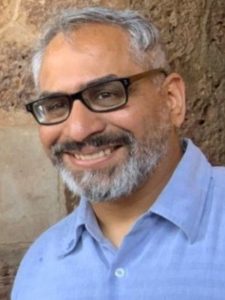Faculty Fellow, Faculty of Liberal Arts & Professional Studies
Faculty Fellow

Harris Ali is a sociologist at York University who teaches courses in environmental studies, disasters, social theory, and environmental health. His studies focus on the social, political, and environmental dimensions of disease outbreaks and environmental disasters. He has conducted various studies on different types of infectious disease outbreaks in various parts of the world, including E. coli in Walkerton, Ontario, tuberculosis amongst the homeless in Toronto, community-based responses to Ebola in Liberia, Sierra Leone, and the Democratic Republic of the Congo. Alongside his long-time research colleague and Dahdaleh Institute Faculty Fellow Roger Keil, Prof. Ali completed a comprehensive study of the 2003 outbreak of SARS in Singapore, Toronto, and Hong Kong. This culminated in an edited volume on SARS (Networked Disease: Emerging Infections in the Global City), which was recognized by The Globe and Mail as one of the "top ten books that offer lessons from past pandemics." He is currently a co-principal investigator with Fuyuki Kurasawa on a Canadian Institutes of Health Research grant that involves big data analyses and AI to understand the role of social media in flaming and countering anti-Asian racism during the present COVID response.
Research keywords:
Politics of infectious disease in the Global South; Frantz Fanon; disease and cities in the Global South
Themes | Planetary Health |
Status | Active |
Events |
Pandemic Urbanism: Infectious Disease on a Planet of Cities, with Harris Ali and Roger Keil | February 3, 2023 Implications of Colonialism for Disease Outbreak Response in Black Communities, with Harris Ali and Yvonne Simpson | January 26, 2023 |
Related Work | |
Updates |
Recap — Research Exploration: Taking a Critical Social Science Approach to Global Health Research | April 10, 2023
Recap — Pandemic Urbanism: Looking at Past Infectious Diseases and Preparing for a Post-Pandemic World | March 13, 2023 Recap — Post-Colonial Legacy and the Challenges to Health and Safety in Black Communities | March 2, 2023 Call for Presentations – 2023 Critical Social Science Perspectives in Global Health Workshop | February 24, 2023 Black History Month 2023: Black Resistance | February 1, 2023 |
You may also be interested in...
Launching New Mini-Series on Wellness and Self Care at the Dahdaleh Institute
Join us for a special three-part series for Wellness and Self Care starting in February 2023! We all encounter stress in our daily lives that at times can be difficult to manage – affecting the ...Read more about this Post
Recap — Epidemiological Modeling in Global Health Crises: From Key Findings to Actionable Strategies, with Ruwan Ratnayake
On December 18, Dahdaleh visiting scholar Dr. Ruwan Ratnayake emphasized the important role of epidemiology in public health responses during humanitarian crises. The seminar highlighted the increasing integration of modern analytical methods such as mathematical ...Read more about this Post
Finalist Award for Best Documentary Announced at 2023 Student World Impact Film Festival
The Planetary Health Film Lab (PHFL) was nominated, and won, a Finalist Award (2nd place) for a documentary titled, "Planetary Health Film Lab – Ecuador Edition" at the Student World Impact Film Festival (SWIFF). SWIFF ...Read more about this Post
